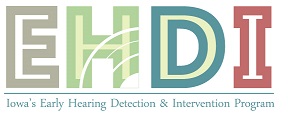Birthing Facilities and Midwives
You Make a Difference
Did you know approximately 95 percent of babies with a hearing loss are born to hearing parents and over 50 percent of babies born with hearing loss have no known risk factors for hearing loss? Of the over 39,000 babies born in Iowa each year, approximately 100 will be diagnosed with a hearing loss shortly after birth. Another 2 to 3 percent of those children that initially passed their newborn hearing screen will be diagnosed with late onset hearing loss. Screening a baby's hearing is very important, even if there is no family history of childhood hearing loss. Equally important is ensuring infants that do not pass their hearing screen receive timely follow up (re-screen and diagnostic assessment, as needed). The first six months of an infant’s life are the most critical for speech and language development. If a hearing loss is detected early, much can be done by families to encourage language development!
Nurses play a vital role in newborn hearing screening and follow up in our state. Currently, only four birthing facilities have audiologists and audiology technicians on staff to assist with screening. The remaining birthing facilities rely on nursing staff to perform all hearing screens prior to hospital discharge while midwives provide education and guidance to the families they serve on where they can take their infant for a hearing screen. We like to think of nurses as being “first responders.” Through screening, a nurse may identify an infant that needs additional testing if they did not pass their newborn hearing screen which in turn may lead to a diagnosis of hearing loss. A nurse may also impact a family’s decision to follow up for a timely outpatient screen through their communication about hearing screening and the information they provide regarding recommended follow up.
Hearing screening results or missed screens should be promptly transmitted to the medical home and the Iowa Department of Public Health's Early Hearing Detection and Intervention program. Communication of the importance of hearing screening, results of the hearing screening and recommended follow up is key to the best possible outcomes for children and to a sustainable system supporting families in Iowa.
Please use the resources to the left to communicate the importance of early detection and intervention in hearing loss and empower your practice and patients with the information they need to navigate the screening process. Thank you for your work. You are a valued member of the Iowa EHDI Team. Together we will work to support children who are deaf or hard of hearing and their families.
Key resources:
Learn about EHDI best practices and access tools to help you meet these standards. Also includes current EHDI research articles.
These are materials that you can use to learn more about the importance of early hearing detection and intervention and share with your patients. There is also a newsletter to keep you informed about the happenings at the EHDI program, a parent fact sheet, a family resource guide and much more.
The EHDI database is the primary system through which EHDI program data is collected. If you have a need to access the database, or want to learn more about how to use the database, the information can be found here.
There are a variety of reporting and referral forms that are available for your use, including to Early ACCESS. Another set of forms that is available are the parent refusal documents.
EHDI operates under Iowa Code and Iowa Administrative Rules. Those documents can be accessed here.
Additional resources to explore with families:
